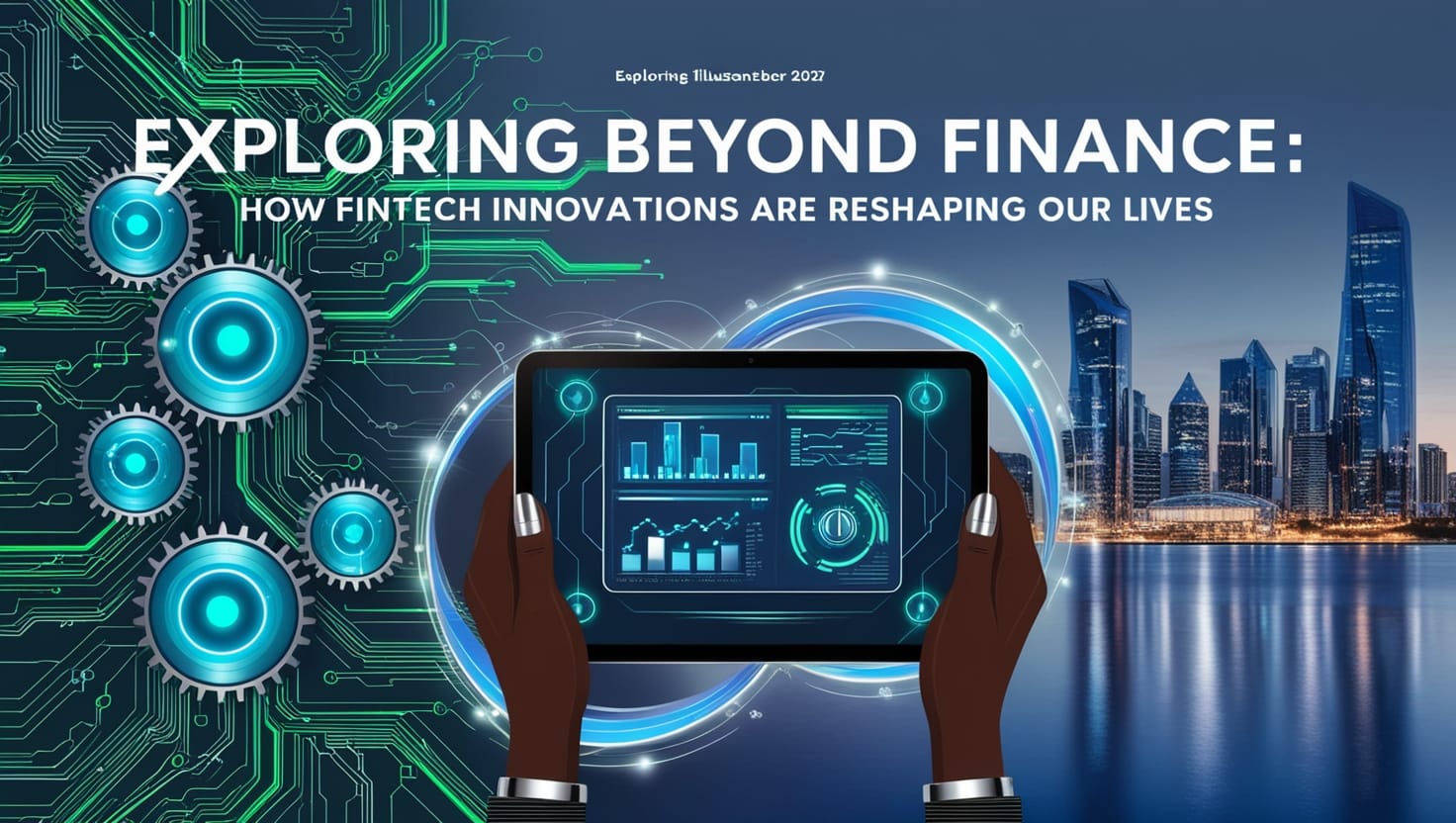Exploring Beyond Finance: How Fintech Innovations Are Reshaping Our Lives-The financial world is undergoing a rapid transformation, thanks to the rise of fintech (financial technology). Beyond just providing new ways to manage money, fintech is reshaping how we think about financial services and pushing the boundaries of what’s possible. Beyond finance, fintech innovations are changing the way we live, work, and interact with the economy. From digital payments to blockchain, let’s explore how these advancements are influencing our daily lives and paving the way for a more inclusive, efficient, and transparent future.
The Rise of Fintech: A New Era in Finance

Fintech is the fusion of technology and financial services, bringing innovations that make financial systems more accessible, efficient, and user-friendly. While traditional financial institutions like banks and insurance companies still play a vital role, fintech is disrupting the old guard by offering alternative, often more affordable, solutions.
In the past, managing finances required physical visits to banks, long waits for loans, or dealing with cumbersome paperwork. Now, with the help of smartphones and cloud computing, financial services are available at our fingertips. Whether it’s transferring money internationally, managing investments, or even getting a loan, fintech innovations are making it easier than ever to interact with our financial lives.
Key Innovations in Fintech: Beyond Finance

- Digital Payments and Mobile Wallets
One of the most significant changes in the financial landscape is the rise of digital payments and mobile wallets. Apps like PayPal, Venmo, and Apple Pay allow users to send and receive money instantly, often at lower fees than traditional banking methods. With the adoption of QR codes, contactless cards, and peer-to-peer payment systems, it’s now possible to manage your finances on-the-go without ever needing to step inside a bank.
The Beyond Finance impact of digital payments extends beyond just convenience. They provide an opportunity for financial inclusion, especially in regions with limited access to traditional banking infrastructure. In countries like India, mobile wallets have become a lifeline for millions, enabling people to receive wages, pay bills, and shop online—all without needing a physical bank account.
- Blockchain and Cryptocurrencies
Blockchain, the technology behind cryptocurrencies like Bitcoin and Ethereum, is another major fintech innovation that’s taking the world beyond finance. Blockchain offers a decentralized and transparent way to record transactions, removing the need for intermediaries such as banks. This shift could revolutionize how we approach everything from cross-border payments to digital contracts.
Cryptocurrencies themselves are offering new opportunities for financial freedom. Many people in regions with unstable currencies are turning to cryptocurrencies as a safer, more reliable store of value. Moreover, blockchain applications go beyond currency. They’re also being used in supply chain management, healthcare, and even voting systems, illustrating how fintech is not just transforming finance but also how we interact with the world. (Read More: How a Financial Institution Can Help You Achieve Financial Independence in 2024)
- Robo-Advisors and Wealth Management
Gone are the days when wealth management was reserved for the ultra-wealthy. Today, fintech is democratizing access to financial advice through the rise of robo-advisors. These digital platforms use algorithms to provide personalized investment advice based on an individual’s risk tolerance, financial goals, and time horizon. Companies like Betterment, Wealthfront, and Acorns allow users to set up automated portfolios with low fees, making investing more accessible than ever.
This shift beyond finance allows a wider audience to access wealth-building opportunities that were once only available to those with substantial financial resources. Robo-advisors are not only making investing easier but also helping individuals take control of their financial futures without relying on expensive financial advisors.
- Lending and Borrowing Platforms
Traditional lending has often been a slow and bureaucratic process, with banks requiring lengthy credit checks and collateral. Fintech is changing this with peer-to-peer (P2P) lending and alternative credit scoring systems. Platforms like LendingClub and Prosper allow individuals to borrow and lend money directly, bypassing traditional banks. These platforms use alternative data points, such as social media activity or transaction history, to assess creditworthiness, offering access to loans for those who may have been excluded from the traditional system.
For borrowers, fintech platforms provide quicker access to funds with lower interest rates, while lenders can diversify their portfolios by offering loans to individuals and small businesses. In this sense, fintech is opening up new avenues for financial freedom, enabling users to manage their finances in a more flexible and accessible manner. (Read More: How Finance Business Strategies are Evolving in the Age of AI)
- Insurtech: Revolutionizing Insurance
Insurance is another sector being dramatically transformed by fintech. Insurtech companies like Lemonade and Root are leveraging technology to simplify and personalize insurance offerings. By using artificial intelligence (AI) and big data, these companies can better assess risk, streamline claims processing, and offer more tailored policies at lower prices.
For consumers, this means more transparency and less friction when buying insurance. It also opens up the possibility for microinsurance products, allowing individuals to insure smaller assets or activities for a fraction of the cost of traditional policies. This innovation is particularly valuable in emerging markets, where insurance penetration is historically low.
The Social Impact of Fintech: Empowering Individuals and Communities
Fintech innovations go beyond finance in the way they empower individuals and communities. In many cases, they are democratizing access to financial services that were once out of reach for large segments of the population. Fintech is enabling financial inclusion, fostering entrepreneurship, and encouraging economic participation at every level.
For instance, mobile banking and lending platforms allow people in rural or underbanked areas to run businesses, save money, and access loans—ultimately helping to reduce poverty and increase financial literacy. In this way, fintech innovations are not just reshaping personal finances but also improving social mobility and economic development across the globe. (Read More: The Role of Blockchain in Revolutionizing Finance and Accounting Practices)
The Future of Fintech: A World Beyond Finance

The future of fintech is exciting. As technology continues to advance, we can expect even more disruptive innovations that make financial services even more accessible, efficient, and transparent. With advancements in artificial intelligence, machine learning, and quantum computing, the potential for fintech to revolutionize not just finance, but how we live, is limitless.
Fintech is moving us beyond finance in ways that were previously unimaginable. Whether it’s through the use of digital currencies, personalized financial services, or more efficient insurance models, the impact of these innovations will continue to ripple across every aspect of our lives. As we embrace these changes, we can look forward to a future where financial freedom and economic opportunity are within reach for everyone.
Conclusion article Exploring Beyond Finance: How Fintech Innovations Are Reshaping Our Lives
Fintech is far more than just a technological trend; it’s a fundamental shift in how we approach money, services, and the economy. From mobile wallets to blockchain, the innovations reshaping finance today are empowering individuals, promoting financial inclusion, and fostering a more equitable and transparent financial ecosystem. As we move beyond finance, the future looks brighter, more inclusive, and full of possibilities for individuals and businesses alike.





[…] its core, decentralized banking is about shifting away from traditional financial institutions such as banks, insurance companies, and brokers. Instead of relying on intermediaries […]